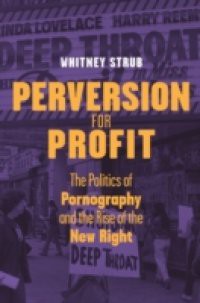While America is not alone in its ambivalence toward sex, its preferences swing sharply between toleration and censure. This pattern has grown even more pronounced since the 1960s, with the emergence of the New Right and its attack on the "floodtide of filth" supposedly sweeping the nation. Antipornography campaigns became the New Right's political capital in the 1960s, laying the groundwork for the "family values" agenda that shifted the country to the right. Perversion of Profit traces the anatomy of this trend, conducting archival research in twenty-four states and recounting the debates over obscenity that consumed members of the ACLU in the 1950s, the deployment of obscenity charges against gay media during the cold war, and the rise of the influential Citizens for Decent Literature during the 1960s.Whitney Strub illustrates the crucial function of pornography in constructing the New Right agenda, which emphasized social issues over racial and economic inequality. He situates the fight over obscenity within the politics of 1950s pop culture and the pivotal events that followed: the sexual revolution, feminist activism, the "porno chic" moment of the early 1970s, and resurgent Christian conservatism, which now shapes public policy far beyond the issue of sexual decency. Following these battles to the early months of the Obama administration, Strub isolates the undercurrents of anti-Communist rhetoric that once powered the antipornography movement and continues to permeate political discourse. Connecting the lowest forms of entertainment to the highest levels of government, he revolutionizes our understanding of sex and American politics.

